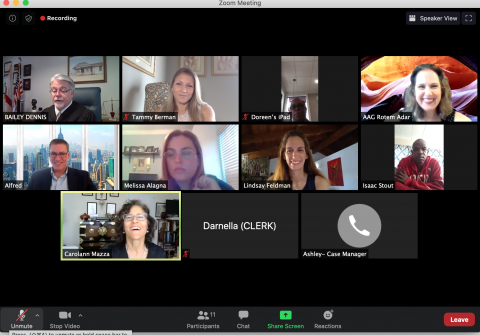
As the co-chair of the Pro-Bono Pilot Project in the Broward County Court House, part of my job is to reach out to our local professional Collaborative community and gather volunteers (including attorneys, neutral facilitators, and neutral financial professionals), who are assigned into teams. When the project began to take off and cases started to be assigned, there was a buzz of excitement amongst our Collaborative professionals. For many of them, they were finally getting to put the Collaborative Divorce Process into practice! They were also getting an opportunity to establish and build new working relationships with like-minded professionals.
The clients that come to us in this pilot project are required to be pro se, with children, have no history of criminal or domestic violence, or any open dependency cases, (among other newly implement criteria that have been put into place in order to improve the vetting process). The clients we have seen so far have frequently been low to middle income-level families who would unlikely be able to afford the services of an attorney, let alone a team of professionals, to help them through a divorce.
As Collaborative professionals, we know that the alternatives to the Collaborative Process are not as well equipped to address the needs of transitioning families with children. Furthermore, litigated cases are at the mercy of the timeline and the protocols of the court system. It feels like a privilege to be able to offer a better alternative opportunity for these families and to give them a potentially better shot at divorce than a litigated experience could likely provide.
There have been six rounds of cases assigned, and the response from the professionals has been mostly positive with some frustrations. As a result of gaining feedback from the professional volunteers, we have learned ways to streamline the process and support new teams better. As an example, we have created a welcome email to new teams with documents to use as a guide, more detailed information and guidance to orient the professionals on how to proceed, and we are now improving our presentation when vetting potential candidates.
I am proud to have worked as the neutral facilitator (also known as coach) on the first and now the second case that successfully completed with the Pro Bono Collaborative Pilot Project. The final hearing occurred this past week, and it was my first zoom meeting with a judge. Our team struggled to find ways to support this family that had unique financial issues that were challenging to address. The parents had not communicated with each other in almost a year. This process was not easy for either of them, but I do believe their outcome was able to preserve the one asset they shared and provide them both with agreements they could comfortably live with.
When I reached out to one of the attorneys on the team, Carolann Mazza, her comments were: “This was the first time the professional team worked together and the first Collaborative case for one of the lawyers. The varying personalities of the professional team melded well and the diverse experience each of us brought to the table contributed to the success of the case. Throughout the case, we felt frustration at times because of what we perceived as a lack of appreciation and a lack of commitment on the part of the clients. Fortunately, we held several professional team pow-wows to figure out the direction to take with this particular couple. Bringing the challenging issues back to the team is largely what kept this case going. A cohesive team, the team's ability to keep the family at the forefront of the matter, and team option building made this a positive experience.”
We will continue to course-correct as we learn more from our experiences. We will improve the quality and experience of all those involved in a case. I know this project will continue to expose more and more people to the Collaborative Divorce Process and hopefully help our community begin to realize that there is a better way of getting divorced.